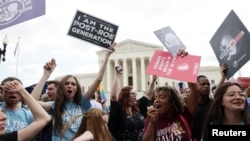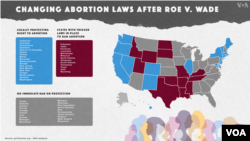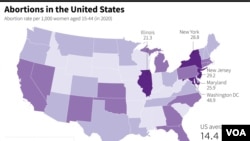When the U.S. Supreme Court issues an opinion, that opinion becomes the law of the land.
That is the immediate effect of the high court's decision to overturn its 1973 abortion ruling known as Roe v. Wade: the right to have an abortion is no longer constitutionally protected in the United States.
But the controversy is likely to linger, and not only in the court of public opinion.
By leaving it to the states to decide whether to permit abortion, the high court ruling is expected to trigger a fresh wave of legal battles in state courts that could drag on for years.
"It creates a lot of uncertainty and potential delays from the standpoint of criminal laws," said Mary Ziegler, a professor of law at the University of California Davis and author of five books about the abortion debate.
The Guttmacher Institute, an abortion rights research group, estimates that 26 states are certain or likely to ban abortion, including 13 states with so-called "trigger laws" that go into effect with Roe's repeal and nine with abortion bans on their books that predate Roe.
Just how soon the bans would be implemented remains uncertain. But abortion rights groups such as Planned Parenthood and the American Civil Liberates Union say they are determined to fight the restrictions and ensure abortion remains accessible to women seeking the procedure.
"The ACLU has been preparing for this moment for years and we're going to continue to carry out the multipronged, multifaceted approach to fight and press forward with the fight against [the] abortion ban and restrictions," said Meagan Burrows, a staff attorney with the ACLU's Reproductive Freedom Project.
Part of the ACLU's legal strategy would be to challenge abortion bans in state courts, Burrows said.
Clarke Forsythe, senior counsel with Americans United for Life, an anti-abortion group, said he expects legal challenges in two to three dozen states over the next couple of years.
"But I think at the end of the day, only perhaps a handful or less may create a state right to abortion," Forsythe said in an interview.
In recent decades, abortion rights groups have mostly turned to federal courts to block new state laws restricting the procedure. But with abortion rights no longer protected under the federal constitution, their focus would now shift to state courts.
"Obviously, the stakes will be higher because it won't be as a sort of supplement to federal protections," Ziegler said.
To be sure, legal challenges won't be feasible in every state, experts and advocates say.
In recent years, four Southern states — Alabama Louisiana, Tennessee and West Virginia — have changed their legal charters to proclaim that abortion is not a constitutional right.
Forsythe said votes in two other states — Iowa and Kansas — are likely to endorse similar constitutional amendments later this year.
That makes it virtually impossible to challenge these states' abortion bans under their constitutions, said Elizabeth Nash, principal policy associate with the Guttmacher Institute.
But other states present potential avenues for legal challenges.
Eleven states, including Florida, have the right to privacy enshrined in their constitutions, while several others, such as Arizona, have equal protection clauses. These provisions have been interpreted by some state supreme courts in recent decades to uphold abortion rights.
Burrows said the ACLU is “investigating each state constitution to get a sense of the claims that we could bring."
"In states where we've identified a path to challenging abortion bans with our local partners, I think we can expect to see challenges filed following the issuance of any Supreme Court decision that would overturn Roe,” she said, without naming the states.
Ziegler, of UC Davis, said the outcome of the state court cases is far from certain and would depend in large part on the composition of a given state's supreme court.
Take Florida, where Planned Parenthood recently mounted a constitutional challenge to the state's recently enacted 15-week ban on abortion that is set to take effect July 1.
In 1989, the Florida Supreme Court recognized abortion as a fundamental right under the state constitution. But Ziegler said Republican Governor Ron DeSantis has transformed the court with conservative appointments.
"And so, we're likely to see in that state the door open to much more sweeping restrictions," Ziegler said.
The Midwestern state of Michigan could go the other way, Ziegler said. The state Supreme Court has four elected Democratic justices and three appointed Republican members. In anticipation of Roe's repeal, Planned Parenthood in April challenged an unenforced, pre-Roe ban on abortion that could go into effect after the Supreme Court ruling comes down.
A local judge last month issued an injunction against its enforcement, saying abortion is protected under the state constitution.
"Carving out protection (for abortion rights) is a possibility in a place like Michigan," Ziegler said.
Forsythe, of the Americans United for Life, said efforts to get state supreme courts to recognize the right to abortion could backfire, as one did in Tennessee.
In 2000, the Tennessee Supreme Court ruled that a woman's decision to have an abortion is "a vital part of privacy guaranteed by the Tennessee Constitution."
Fourteen years later, Tennessee voters approved a constitutional amendment that says, “Nothing in this constitution secures or protects a right to abortion or requires the funding of an abortion."
As for abortion rights groups, many say they're not putting all their eggs in the legal basket.
“We can't rely on the judiciary, be it the federal judiciary or the state judiciary alone, to protect the rights and freedoms that we hold dear from government intrusion,” Burrows, of the ACLU, said.
Instead, “the focus will have to turn to mobilizing people to fight back, not just at the courthouse but at the state house, at the ballot box, in the streets to make abundantly clear to politicians that the majority of Americans want to keep abortion legal,” she said.










